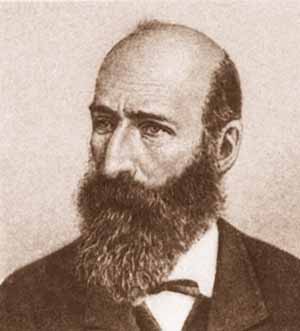- Alexander Afanasyev
Infobox Writer
name = Alexander Nikolayevich Afanasyev

caption =
birthdate = birth date|1826|7|11|mf=y
birthplace =
deathdate = death date and age|1871|10|23|1826|7|11|mf=y
deathplace =
occupation =folklorist
genre =
political movement =
notableworks =
influences =
influenced =
website =Alexander Nikolayevich Afanasyev ( _ru. Александр Николаевич Афанасьев) (
11 July ,1826 —23 October ,1871 ) was aRussia n folklorist who recorded and published over 600 Russianfolktale s andfairytales , by far the largest folktale collection by any one man in the world. [Riordan, James. “Russian Fairy Tales and Their Collectors.” A Companion to the Fairy Tale. Ed. Hilda Ellis Davidson and Anna Chaudhri. Cambridge: D.S. Brewer, 2003. Page 221.] His first collection was published in eight volumes from 1855-67, earning him the reputation of a Russian counterpart to theBrothers Grimm .Life
He was educated at a gymnasium in
Voronezh and studied law atMoscow university [Zipes, Jack. "Afanasyev, Aleksander." "The Oxford Companion to Fairy Tales." Oxford: Oxford University Press, 2000.,] , in which he attended the lectures ofKonstantin Kavelin andTimofey Granovsky . His burgeoning career as a professor of history was cut short by denounciation of his work on the part ofSergey Uvarov . He then turned his attention to journalism and brought out a series of articles about leading personalities of the literary life of the previous century, includingNikolay Novikov ,Denis Fonvizin , andAntiokh Kantemir .Censured by the authorities for his contacts with
Herzen and suffering fromtuberculosis , Afanasyev ended his life in penury, forced to sell his library to enable himself to eat. [Maria Tatar, p 335, "The Annotated Classic Fairy Tales", ISBN 0-393-05163-3] He died inMoscow aged 45.Work
Afanasyev collected many Russian folk tales throughout the course of his career. He is said to have become acquainted with folktales from local women in his home town of
Bobrov . He genuinely hoped that the revival of the native Russian fairy tales would promote the triumph of the Russian language over theFrench language , which had been adopted by the Russian aristocracy.It was in the 1850s that Afanasiev found his vocation in folklore studies. His first scholarly articles - "The Wizards and Witches", "Sorcery in the Ancient Rus", "Pagan Legends about the
Buyan Island" - drew heavily upon the so-called Mythological school that treated folklore as a mine of information for the study of more ancient pagan mythology. His definitive work on the subject - "The Poetic Outlook on Nature by the Slavs" - was published in three volumes between 1865 and 1869. In such an interpretation, he regarded the fairy tale "Vasilissa the Beautiful " as depicting the conflict between the sunlight (Vasilissa), the storm (her stepmother), and dark clouds (her stepsisters). [Maria Tatar, p 334, "The Annotated Classic Fairy Tales", ISBN 0-393-05163-3]In the course of his studies of the
Russian folklore Afanasyev amassed a collection of more than 600 Russian folktales - some of them contributed byVladimir Dahl , others taken from the archives of theRussian Geographical Society and grouped by Afanasiev according to their themes, imagery, and style. He owes his prominent place in the history of Slavonic philology chiefly to "Narodnye russkie skazki " "(Russian Fairy Tales)", eight volumes modelled on the famous collection of theBrothers Grimm and published between 1855 and 1863.Afanasyev edited several other compilations which included: "Russian Fairy Tales for Children" comprising a set of animal, magic and humorous tales from his collection that were suitable to children; "Russian Folk Legends" which was banned due to the harsh censorship in Tsarist Russia (the church thought the collection was blasphemous); and "Russian Forbidden Tales", an assortment of unprintable tales from Russia that had to be published in Switzerland anonymously. [Zipes, Jack. "Afanasyev, Aleksander." "The Oxford Companion to Fairy Tales." Oxford: Oxford University Press, 2000.] Their obscene and anticlerical subject matter made their publication in Imperial Russia unthinkable. [Haney, Hack V. :Mr Afanasiev's Naughty Little Secrets: Russian Secret Tales." SEEFA Journal, Vol. III, No. 2, Fall 1998. 21 April 2007 [http://www.arts.ualberta.ca/SEEFA/ZAVETNYE.HTM] .]
Significance
Prior to Afanasyev's works in the 1850s, only a few attempts had ever been made to record or study the folk beliefs of peasant Russia. Though a written Russian language (
Church Slavonic ) had existed since the 10th century, it was used almost solely by the church and only for parochial written works. It was not until the 18th and 19th centuries that a sizable body of secular literature developed in the vernacular Russian. Thus, Afanasyev's collections made a highly valuable contribution to the dissemination and legitimization of Russian culture and folk belief. The influence of these folk tales can be seen in the works of many writers and composers, notablyRimsky-Korsakov ("Sadko,The Snow Maiden ") andStravinsky ("The Firebird , Petrushka"). [Riordan, James. “Russian Fairy Tales and Their Collectors.” A Companion to the Fairy Tale. Ed. Hilda Ellis Davidson and Anna Chaudhri. Cambridge: D.S. Brewer, 2003. Page 219.]References
External links
* [http://home.freeuk.com/russica4/books/three_w6.rar Russian Folk Tales from Alexander Afanasiev's Collection]
Wikimedia Foundation. 2010.
